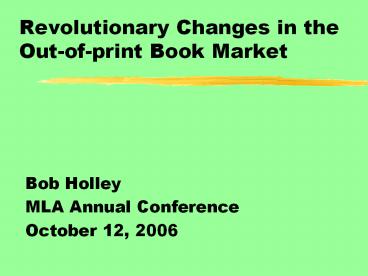PowerPoint PPT Presentation
1 / 22
Title:
1
Revolutionary Changes in the Out-of-print Book
Market
- Bob Holley
- MLA Annual Conference
- October 12, 2006
2
Introduction and Background
- Welcome and introduction
- Demographics of the audience
- Interest in buying, selling, or both
- Are there other experts in the audience?
- This PowerPoint and bibliography will be posted
on the MLA Web site
3
How I Became Interested in this Topic
- Valuing donations to libraries
- High availability of obscure materials
- Perceived decline in prices since 2000
4
Research Funded by LCATS in 2003
- Compared buy and sell ads in AB Bookmans Weekly
(1982 and 1992) with current OP market - 95 availability in all four samples
- Decline in prices in inflation-adjusted dollars
(-45) - Mostly books in humanities, history, and social
sciences
5
Experiences as an OP Book Dealer
- I have sold around 500 titles in one year
- Prices from .75 to 80
- I have put aside around a dozen rare titles for
later - Library books sales have been an excellent source
of stock so that giving this talk is against my
self interest
6
Resources for Buying and Selling
- The metasearch engines
- http//used.addall.com/
- http//bookfinder.com
- The individual dealers
7
Advantages of OP Market for Buying
- 95 availability almost no distinction between
in-print and out-of-print - Retrospective buying for new collecting areas
- Repurchasing missing books
- Lower prices in general
- Many 20th century popular books at 2.95 or less
plus shipping
8
Advantages of OP Market for Buying (continued)
- Lower prices for libraries that can wait
- Publishers concerned by this trend
- May reduce number of books published
- Purchase as substitute for ILL
- Past use as indication of future use
- Item available for long-term use
- Buy not borrow pilot at Wayne State University
- Possible to outsource these purchases
9
Disadvantages of the OP Market for Buying
- Only Alibris consolidates orders for libraries
Strand and Powells Books sell from stock - Other sources list books from multiple vendors
- Each purchase is a separate transaction
- Each purchase is shipped individually
10
Disadvantages of the OP Market for Buying
(continued)
- Most often need a credit card or PayPal
accountno purchase orders - Issues with condition, non-delivery, and returns
11
Selling on the Internet for Libraries--Advantages
- Book sales undervalue many books
- Increased revenue
12
Selling on the Internet for Libraries--Disadvantag
es
- Time involved in the process
- May be practical only for libraries with free
volunteers - Can be complicated
- Required constant attention though sellers can go
on vacation - Removes the books from the community
- Loses the publicity value of book sales
- Local policies may prohibit such sales
13
Where to Sell on the Internet
- Ebaylimited selling period, listing fees,
payment complexities - Sites with easy of entry for relatively few sales
- Half.commore popular materials, lower prices
- Amazon.comhigher fees for casual sellers
14
Where to Sell on the Internet (continued)
- Sites designed for professional sellers and
libraries with larger inventories - Abebooks
- Alibris
- Outsourcing sales to firms like Better World
Books - Exhibiting at MLA
15
How to Sell Successfully on the Internet
- Good service in all areas to achieve a high
feedback rating - Accurate description of condition
- Prompt shipping with excellent packaging
- Dealing with occasional problems
- Statement of non-profit status probably makes
little difference
16
What to SellGeneral Considerations
- Search possible candidates on the metasearch
sites - Higher priced items however the libraries defines
this - You might also put them aside for the local book
dealer - Items with a sales record
- Library discards can be sold but are less popular
17
What to SellSubject and Format (My Opinions)
- Mass market paperbacksno except perhaps those in
pristine condition - Hard cover fictionno except if rare or currently
in high demand - Coffee table booksbeautiful but impossible to
sell if available as remainders
18
What to SellSubject and Format (continued)
- Childrens booksno in general with some
difficult to identify exceptions - Trade paperbacksmany sell well especially those
used in college courses - Textbooksno if not current sell extremely well
if still in use - Religious books--yes
19
What to SellSubject and Format (continued)
- University press booksyes if used in courses
otherwise slow movers - Mediadepends on format, condition, popularity,
and scarcity - Rare booksAmazon, Alibris, or perhaps Ebay
20
Final Considerations
- How to arrange inventory for easy retrieval
- By format
- By title, author, or date of listing
- Determining when to remove an item from sale
21
Bibliography of the Best Resources
- See separate document
22
Questions
- Its your turn to ask any questions.

